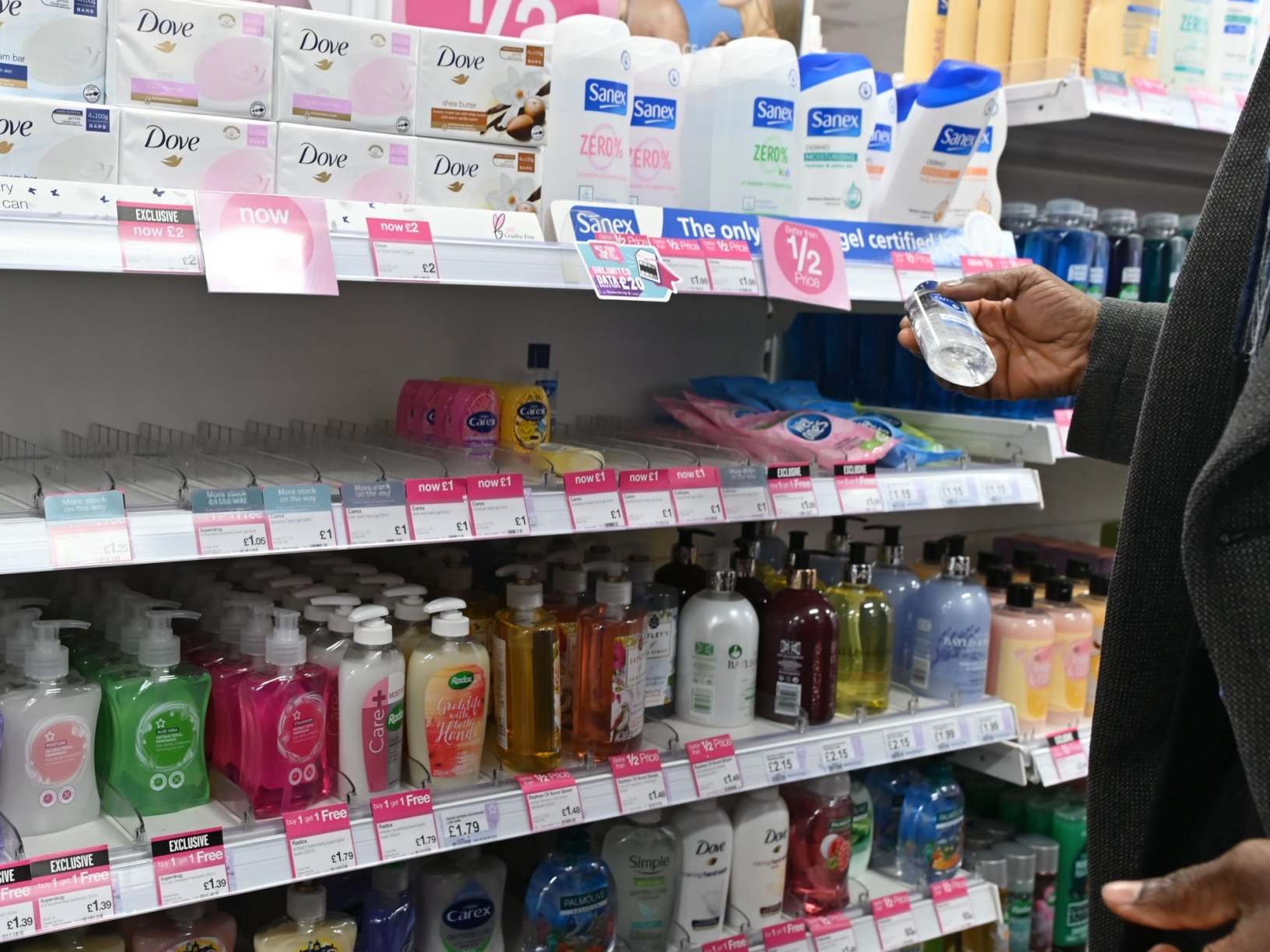There’s the rub: Why the world really contracted mass hand sanitiser hysteria
Everyone now knows that washing hands with soap and water is the most effective way of beating the virus, right? So what’s behind the continuing explosion in hand gel sales, asks Sam Hancock


Your support helps us to tell the story
From reproductive rights to climate change to Big Tech, The Independent is on the ground when the story is developing. Whether it's investigating the financials of Elon Musk's pro-Trump PAC or producing our latest documentary, 'The A Word', which shines a light on the American women fighting for reproductive rights, we know how important it is to parse out the facts from the messaging.
At such a critical moment in US history, we need reporters on the ground. Your donation allows us to keep sending journalists to speak to both sides of the story.
The Independent is trusted by Americans across the entire political spectrum. And unlike many other quality news outlets, we choose not to lock Americans out of our reporting and analysis with paywalls. We believe quality journalism should be available to everyone, paid for by those who can afford it.
Your support makes all the difference.The panic buying of hand sanitiser has become a worldwide pandemic in and of itself. According to recent data by consumer knowledge experts Kantar Worldpanel, global supermarket sales of alcoholic hand gels have risen by 255 per cent. This is hardly a surprise considering the constant messaging from bodies such as Public Health England, that we are being “relied on” to clean our hands and that we are expected to do so for roughly 20 seconds at a time.
Lisa Blackman, who is a media and communications professor at Goldsmiths University, has been studying panic and contagion for 20 years. She says hand sanitiser, like toilet roll, is linked to disinfection and therefore provides the means to engage in practices that enable people to feel like they are decontaminating any potential pollutants.
“Given viruses are invisible and pass from person to person they threaten a clear sense of a self-enclosed border or boundary, which is important to western individualised notions of the self,” she tells me. “This is threatening and might create feelings of abjection. Practices where people feel like they are reinstating a false sense of privacy and boundary are important to manage feelings of anxiety that might be provoked.”
She adds: “I say a false sense of privacy and boundary, because what viruses like coronavirus show us is that we are all fundamentally connected and dependent on each other.”
It isn’t just sales of hand sanitiser that have risen either. Some hospitals in the UK, US, Malaysia and Central America have reported a spike in thefts of the bacteria-killing gel. Northampton General Hospital told BBC News that bottles were being taken from patients’ beds and dispensers ripped off walls, with bosses saying the gel was “disappearing every day” and they have had to limit the supply on wards. Some shops have also been caught upselling bottles to make a considerable profit from anxious customers as they try frantically to protect themselves from catching or spreading the virus.
Estelle Botbol and Marina Baz, both postgraduate students at Imperial College in London, were shocked to find that the price of a single bottle of hand sanitiser had risen from less than £5 to just over £40 at a pharmacy on High Street Kensington, west London. “I’d been to 10 or 20 shops by this point and was desperate because nowhere had any [sanitiser] left in stock,” Botbol, who is worried about catching the virus through her nail biting habit, tells me. “When I saw the little bottle in the middle of the counter, I was so happy. I joked to the woman behind the till, saying: ‘Please don’t tell me it’s £100 or something’. She laughed and said: ‘No, don’t be silly, it’s only £40.99’.”
“We thought we’d misheard her say £14.99,” her friend and housemate, Baz, says, “so I double checked, but she confirmed she’d said £40.99 and so we left empty-handed.” Botbol and Baz, originally from Paris, laugh while they recount the story, adding that the woman behind the counter insisted they look at her computer screen so they could see she “really wasn’t lying”.
Sneezing or coughing into your hands also requires more than just a pump of hand sanitiser to disinfect them
Unsurprisingly, the inflation trend is common. Over the weekend, the Edinburgh Evening News reported that a Pound Savers Homestore in the Scottish capital had received backlash for charging customers £6.99 for a single bottle of the gel. Similarly, a tweet by James Deegan went viral last week when he filmed shopkeepers at Canons Park Newsagents in Edgware, northwest London, who were charging £10 for a four-pack of toilet roll (usually sold for £2.50). Suddenly the thefts of hand sanitiser from hospitals don’t seem so shocking. Panic buying seems to highlight the demarcation in Britain’s class system, as it is implied that essential supplies are available exclusively to those with money.
Pharmacists have even been forced to ration sanitisers to avoid people bulk-buying them. Jamie Harkin, who lives in Tyrone, Northern Ireland, says the new rules have been tough on him and his family, as they’re not only buying supplies for themselves but his “at-risk” grandparents too. “My friend and I heard our local Boots were selling hand sanitiser by request only, so we went to the shop to ask and were told it was strictly one per person,” he says. “I completely understand, and agree with why shops are doing it, but my grandparents are in the high risk category, so we had no choice but to go back 20 minutes later, find a different cashier and buy two more bottles.”

Hand sanitiser has been popular in the UK since it made the move from hospital wards to high streets in the 2000s – though it wasn’t until 2012, when stores such as Superdrug and even WH Smith began reporting between 10 and 30 per cent surges in sales of the gel, that it became a staple accessory in many pockets and handbags. At the end of last year, the global hand sanitiser market was reportedly worth £1.02bn. But its popularity and, generally, effective use should not mean it replaces soap and traditional hand washing.
Manal Mohammed, a medical microbiology lecturer at the University of Westminster, says hand washing with soap and water is “far more effective” than using alcohol-based hand sanitisers. “Research has found that the detergent effect of soap and the friction of washing work together to reduce the number of microbes on our hands, as well as the dirt and organic materials,” she says. “Sneezing or coughing into your hands also requires more than just a pump of hand sanitiser to disinfect them. This is because if your hands are contaminated with mucus, the hand sanitiser might not work as well because mucus acts to protect microbes.”
Sadly, this current government appear to be reinforcing the message that you are on your own
That message seems to have been lost on the general public, though. The same data that shows a colossal surge in hand gel sales around the world also shows a surprisingly small increase in liquid hand soaps (7 per cent) and household products (10 per cent) being bought by customers. Clearly the “panic” part of the term “panic buying” has taken hold. Ironically, for hand sanitiser to be in any way effective in killing germs it must contain at least 60 per cent alcohol. And yet, says Mohammed, a lot of the brands we’re seeing sell out or be rationed in UK shops don’t even meet this criteria.
So why are people buying gels en masse? The main reason seems to be a fear of the unknown, says Blackman of Goldsmiths, and its ability to ease people’s concerns. “This kind of buying temporarily relieves some of the anxieties people are feeling, but ultimately the capacity to feel safe during this crisis has to be managed by good leadership and a feeling that people are not on their own,” she says. “Sadly, this current government appear to be reinforcing the message that you are on your own and that the government won’t be stepping in to manage what is a structural issue to do with systems that are not sensitive enough to respond to spikes in demand.”
Emma Kenny, who is the resident psychologist on ITV’s This Morning, says supplies such as hand sanitiser can help people to feel more assured at times of uncertainty. Because families are afraid of isolation – “and want to protect one another” – they develop a strong desire to be over-prepared, which helps them to feel more psychologically settled than being in a position of want. “Fear makes people act more selfishly – tribe protection becomes almost instinct based,” Kenny says. “Looking after the people you love and care for becomes paramount and the usual altruism becomes a secondary concern.”
Ultimately, says Blackman, people need to feel safe – “that they can at least cover basic health and hygiene needs” – which these panic buying scenes suggest isn’t the case. Hand sanitiser is clearly more a symbol of that safety than it is the desired product. In among the madness, though, what’s important to remember is this: for all the reminiscing of what life was like BC (before coronavirus), there will be a life AC – and that’s worth remembering when you’re next in Sainsbury’s, staring at empty shelves, wondering where else you can go to find your favourite bottle of Carex.
For NHS guidelines on how best to wash your hands, see nhs.uk/best-way-to-wash-your-hands
Join our commenting forum
Join thought-provoking conversations, follow other Independent readers and see their replies
Comments